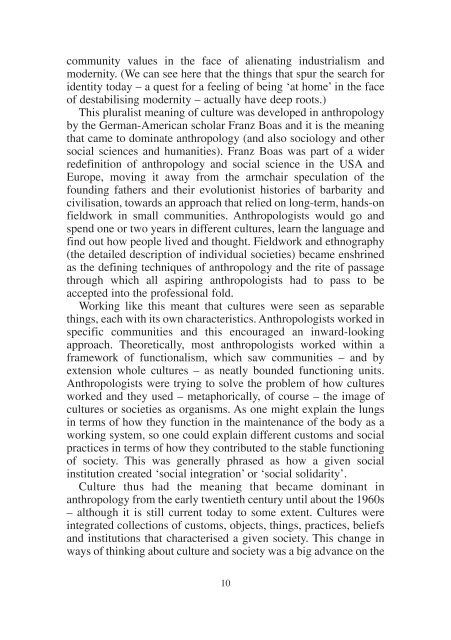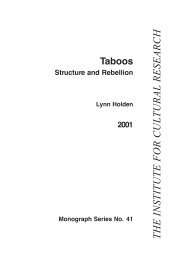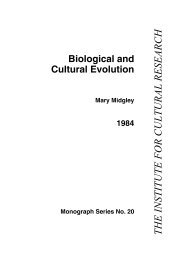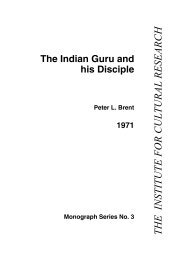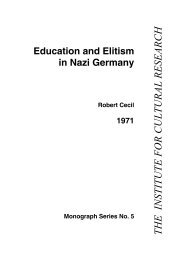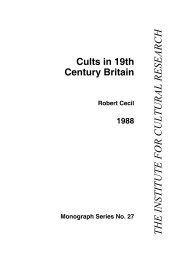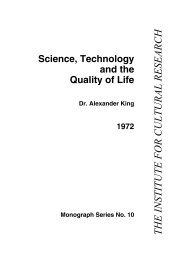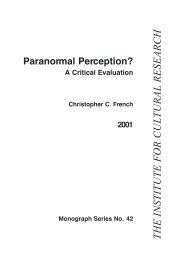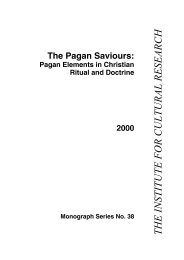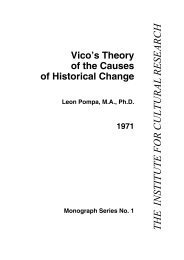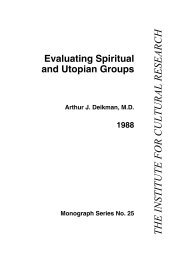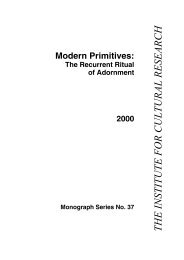Cultural Identity: Solution or Problem - The Institute For Cultural ...
Cultural Identity: Solution or Problem - The Institute For Cultural ...
Cultural Identity: Solution or Problem - The Institute For Cultural ...
Create successful ePaper yourself
Turn your PDF publications into a flip-book with our unique Google optimized e-Paper software.
community values in the face of alienating industrialism and<br />
modernity. (We can see here that the things that spur the search f<strong>or</strong><br />
identity today – a quest f<strong>or</strong> a feeling of being ‘at home’ in the face<br />
of destabilising modernity – actually have deep roots.)<br />
This pluralist meaning of culture was developed in anthropology<br />
by the German-American scholar Franz Boas and it is the meaning<br />
that came to dominate anthropology (and also sociology and other<br />
social sciences and humanities). Franz Boas was part of a wider<br />
redefinition of anthropology and social science in the USA and<br />
Europe, moving it away from the armchair speculation of the<br />
founding fathers and their evolutionist hist<strong>or</strong>ies of barbarity and<br />
civilisation, towards an approach that relied on long-term, hands-on<br />
fieldw<strong>or</strong>k in small communities. Anthropologists would go and<br />
spend one <strong>or</strong> two years in different cultures, learn the language and<br />
find out how people lived and thought. Fieldw<strong>or</strong>k and ethnography<br />
(the detailed description of individual societies) became enshrined<br />
as the defining techniques of anthropology and the rite of passage<br />
through which all aspiring anthropologists had to pass to be<br />
accepted into the professional fold.<br />
W<strong>or</strong>king like this meant that cultures were seen as separable<br />
things, each with its own characteristics. Anthropologists w<strong>or</strong>ked in<br />
specific communities and this encouraged an inward-looking<br />
approach. <strong>The</strong><strong>or</strong>etically, most anthropologists w<strong>or</strong>ked within a<br />
framew<strong>or</strong>k of functionalism, which saw communities – and by<br />
extension whole cultures – as neatly bounded functioning units.<br />
Anthropologists were trying to solve the problem of how cultures<br />
w<strong>or</strong>ked and they used – metaph<strong>or</strong>ically, of course – the image of<br />
cultures <strong>or</strong> societies as <strong>or</strong>ganisms. As one might explain the lungs<br />
in terms of how they function in the maintenance of the body as a<br />
w<strong>or</strong>king system, so one could explain different customs and social<br />
practices in terms of how they contributed to the stable functioning<br />
of society. This was generally phrased as how a given social<br />
institution created ‘social integration’ <strong>or</strong> ‘social solidarity’.<br />
Culture thus had the meaning that became dominant in<br />
anthropology from the early twentieth century until about the 1960s<br />
– although it is still current today to some extent. Cultures were<br />
integrated collections of customs, objects, things, practices, beliefs<br />
and institutions that characterised a given society. This change in<br />
ways of thinking about culture and society was a big advance on the<br />
10


